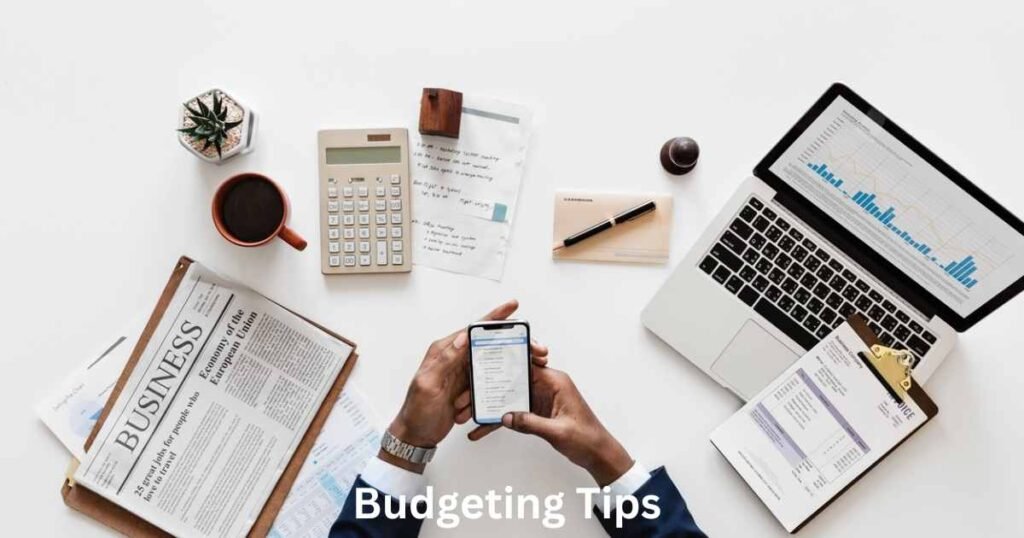Did you know that an astonishing 63% of freelancers admit to frequently using personal funds to cover business-related expenses? Budgeting is not only essential for personal financial stability but also crucial for maintaining a healthy and sustainable freelance business.
Navigating the world of freelancing comes with its own set of challenges, and one of the most crucial aspects is budgeting. In this blog post, we will provide you with a vital guide on how to effectively budget as a freelancer. With essential pointers and practical advice, you can take control of your finances and achieve financial stability in your freelance career.
The Relevance of Budgeting as a Freelancer

Creating a budget is essential for freelancers and businesses alike as it provides a structured method for managing finances and income. It plays a key role in maintaining financial stability by helping freelancers and businesses plan and execute their financial strategies effectively.
Here are some fundamental reasons highlighting the significance of budgeting for freelancers.
Managing Variable Income
Unlike traditional employees, freelancers do not have the luxury of a stable income. This highlights the importance of closely monitoring their finances and implementing effective strategies to manage the unpredictable nature of their work.
A freelance budget serves as a valuable tool in managing variable income and ensuring financial stability during less prosperous periods.
Expense Control
For freelancers, both personal and business expenses are important aspects of their financial life. With freelance budgeting, freelancers can effectively manage and control these expenses like professionals.
Many experienced freelancers choose to invest in expense management software to simplify the process of recording, tracking, and managing their personal and business expenses effortlessly.
Tax Planning and Management for Freelancers
Tax planning and management are important elements of freelance budgeting. Unlike salaried individuals, freelancers are responsible for managing their own taxes. Effective budget planning allows freelancers to ensure accurate tax compliance and avoid any unforeseen tax liabilities.
Buffer Fund for Uncertain Times
Freelancers face the challenge of variable incomes, making it essential to prioritize the creation of a buffer or emergency fund. An emergency fund provides financial security during lean periods or unexpected events.
Effective budget planning enables freelancers to allocate funds towards building and managing their emergency fund, ensuring stability and peace of mind for the future.
Retirement Planning for Freelancers
As freelancers do not have employer-sponsored retirement plans or pension schemes, they must take charge of their own retirement planning. Freelance budgeting plays a vital role in focusing on emergency funds and investments that contribute to long-term retirement planning. By allocating funds wisely and planning for the future, freelancers can secure their financial well-being in retirement.
Budgeting Tips

Budgeting is an essential practice for freelancers to ensure financial stability and success in their career. Unlike traditional employees, freelancers face unique challenges, such as varying income streams and irregular workloads.
To navigate these challenges and achieve financial security, freelancers must adopt effective budgeting strategies. In this guide, we will provide you with valuable tips and insights on how to budget as a freelancer.
1. Calculate Your Average Monthly Income
As a freelancer, your monthly income may vary from one month to another. To create an accurate budget, it is crucial to calculate your average monthly income. Add up your income over the past twelve months and divide it by twelve to arrive at your average monthly income. If you have not been freelancing for a full year, you can divide your income by the number of months worked to get a representative average.
2. Identify Your Fixed and Variable Expenses
Once you have determined your average monthly income, it’s time to list your fixed and variable expenses. Fixed expenses are essential costs that remain relatively constant each month, such as rent or mortgage payments, insurance premiums, and loan repayments. Variable expenses, on the other hand, are flexible and can vary from month to month, such as groceries, utilities, transportation, and marketing expenses.
3. Prioritize Your Expenses
After listing your expenses, it’s important to prioritize them based on their importance and necessity. Identify which expenses are essential for your daily life and which ones can be reduced or eliminated. By cutting out non-essential expenses, you can free up more funds for savings, taxes, and emergencies.
4. Plan for Taxes
As a freelancer, you are responsible for managing your own taxes. It’s crucial to set aside a portion of your income for tax payments. Consult with a tax professional to understand your tax obligations and ensure compliance with tax regulations. Utilize freelancer tools and invoicing software to track your income, expenses, and tax deductions easily.
5. Create an Emergency Fund
Building an emergency fund is essential for freelancers. Set aside a portion of your income each month to create a buffer for unexpected expenses or periods of low income. Aim to save at least three to six months’ worth of living expenses in your emergency fund.
6. Review and Adjust Your Budget Regularly
Budgeting is an ongoing process, and it’s important to review and adjust your budget regularly. As your income and expenses fluctuate, revisit your budget to ensure it aligns with your current financial situation. This will help you stay on track and make necessary adjustments to meet your financial goals.
7. Utilize Freelancer Tools and Software
Take advantage of freelance tools and software to streamline your budgeting process. Freelance invoicing software, for example, can help you track your income, expenses, and invoices in one place. This not only saves time but also provides a clear overview of your financial situation.
8. Establish Multiple Income Streams
To enhance your financial stability as a freelancer, consider diversifying your income streams. Relying on a single client or project can be risky. Explore opportunities to secure additional projects or clients to ensure a steady flow of income.
9. Invest in Professional Development
Investing in your professional development is crucial for long-term success as a freelancer. Set aside a portion of your income for courses, workshops, or certifications that can enhance your skills and expand your clientele. This investment can lead to higher-paying projects and long-term career growth.
10. Seek Professional Advice
If you find budgeting challenging or overwhelming, consider seeking professional advice. A financial advisor or accountant experienced in working with freelancers can provide valuable insights and guidance tailored to your specific financial situation.
Leveraging Technology for Budgeting Efficiency

Freelancers can harness the power of technology to streamline their budgeting process and improve efficiency. There is a wide range of digital tools and apps designed specifically for budgeting and financial management, making it easier than ever to track income, expenses, and savings goals.
- Budgeting Apps
Explore popular budgeting apps like Mint, YNAB (You Need a Budget), or PocketGuard, which allow freelancers to sync their bank accounts, categorize expenses, set budgets, and receive real-time alerts about their financial activity.
- Expense Tracking Software
Consider investing in expense tracking software such as Expensify or QuickBooks Self-Employed, tailored to freelancers’ needs. These tools automate expense tracking, receipt scanning, and mileage tracking, saving time and ensuring accuracy come tax season.
- Invoicing and Accounting Software
Opt for invoicing and accounting software like FreshBooks or Wave, which not only streamline the invoicing process but also provide insights into cash flow, profit and loss statements, and tax reports.
- Automation and Integration
Take advantage of automation features offered by these tools to schedule recurring payments, automate savings transfers, and generate financial reports effortlessly. Integration with banking and accounting platforms ensures seamless data flow and reduces manual input errors.
Cultivating Financial Discipline and Mindset

Beyond tools and strategies, cultivating a disciplined financial mindset is crucial for freelancers to stay on track with their budgeting goals. Freelancing often comes with irregular income streams and fluctuating workloads, requiring freelancers to adopt a proactive approach towards financial management.
- Set Clear Financial Goals
Define short-term and long-term financial goals that align with your aspirations and lifestyle. Whether it’s saving for a vacation, paying off debt, or building a retirement nest egg, having clear objectives provides motivation and direction in your budgeting journey.
- Practice Delayed Gratification
Learn to differentiate between wants and needs, and prioritize delayed gratification over impulse spending. Before making a purchase, ask yourself if it aligns with your financial goals and if there are more cost-effective alternatives.
- Establish Healthy Financial Habits
Cultivate habits such as regular savings, mindful spending, and tracking expenses diligently. Consistency is key to building financial resilience and weathering economic uncertainties as a freelancer.
- Stay Flexible and Adaptable
Embrace flexibility in your budgeting approach to accommodate unforeseen expenses or changes in income. Be prepared to adjust your spending habits and financial goals as circumstances evolve.
- Seek Accountability and Support
Share your budgeting goals with a trusted friend, family member, or fellow freelancer who can provide accountability and encouragement. Join online communities or forums where freelancers exchange tips, share experiences, and offer support in navigating financial challenges.
Final Thoughts
Budgeting is a foundational practice for freelancers to ensure financial stability and success in their careers. By implementing effective budgeting strategies, freelancers can navigate the challenges of variable income and irregular workloads while achieving their financial goals.
From calculating average monthly income to prioritizing expenses and planning for taxes, mastering budgeting skills is essential for freelancers to thrive in the competitive freelance landscape.
By following these budgeting tips and continuously reviewing and adjusting their budgets, freelancers can take control of their finances and build a sustainable and prosperous freelance business.
FAQs
Why is budgeting important for freelancers?
Budgeting is essential for freelancers to manage their variable income, control expenses, plan for taxes, and build financial stability in their careers.
How can freelancers calculate their average monthly income?
Freelancers can calculate their average monthly income by adding up their income over the past twelve months and dividing it by twelve to arrive at an average.
What expenses should freelancers prioritize in their budgets?
Freelancers should prioritize essential expenses such as rent or mortgage payments, insurance premiums, loan repayments, taxes, and savings for emergencies and retirement.
How often should freelancers review and adjust their budgets?
Freelancers should review and adjust their budgets regularly, ideally on a monthly basis, to ensure alignment with their current financial situation and goals.
